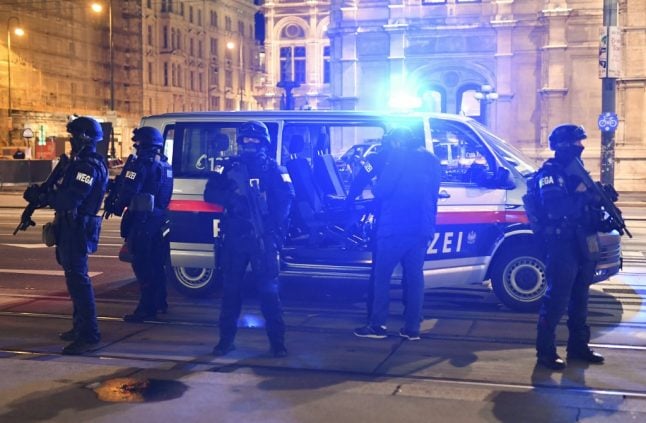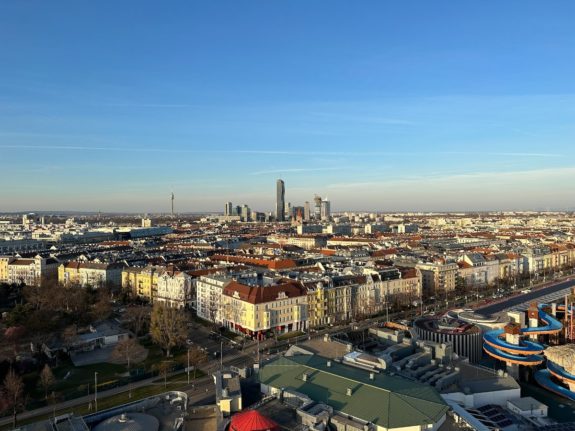Vienna police confirmed that around 8:00pm shots were fired in the Seitenstettengasse area.
They said there were “several perpetrators” with “rifles” and added there were a total “six different shooting locations”.
Police confirmed that one person had been killed and several others injured, including a police officer.
One of the attackers had also been killed, police said.
The mayor of Vienna then confirmed that a second person had died from the injuries.
“After this terrible crime… a second woman has died of her injuries,” Vienna Mayor Michael Ludwig told public broadcaster ORF.
By Tuesday morning the death toll had risen to four.
“Sadly a fourth victim has died in a Vienna hospital, this brings the the death toll to two men and two women,” an interior ministry spokesman told AFP.
At 11:20pm Vienna police said their operation was “still active” and urged people to stay home and take shelter and not use public transport.
Still active: Stay at home! If you're on the Streets, take shelter! Keep away from public places, don't use public Transportation! #0211w
— POLIZEI WIEN (@LPDWien) November 2, 2020
Interior Minister Karl Nehammer said a manhunt was underway across the city and beyond. He called the “attackers heavily armed and dangerous.”
“We have brought several special forces units together that are now searching for the presumed terrorists,” he said. “I am therefor not limiting it to an area of Vienna because these are mobile perpetrators, Nehammer told ORF broadcaster.
 Austrian police stand guard as patrons leave the opera in Vienna. Image: Joe Klamar / AFP
Austrian police stand guard as patrons leave the opera in Vienna. Image: Joe Klamar / AFP
A spokesman for Vienna's Health Association confirmed that 15 people had been admitted to medical clinics with serious injuries as a result of the attack.
Later on Monday evening Chancellor Sebastian Kurz described the shooting as a “repulsive terror attack”.
“We are experiencing difficult hours in our republic,” Sebastian Kurz said on Twitter.
“Our police will act decisively against the perpetrators of this repulsive terror attack,” he said, adding that “we will never be intimidated by terrorism and we will fight this attack with all means”.
CONFIRMED at the moment:
*08:00 pm: several shots fired, beginning at Seitenstettengasse
*several suspects armed with rifles
*six different shooting locations
* one deceaced person, several injured (1 officer included)
*1 suspect shot and killed by police officers #0211w— POLIZEI WIEN (@LPDWien) November 2, 2020
If you have footage of any kind of the shooting incident in the inner city of Vienna – please upload it on this link – DON’T share it on social media! This way you can support us! https://t.co/FQ2he2MMPs #0211w
— POLIZEI WIEN (@LPDWien) November 2, 2020
 Armed Austrian policemen stop traffic from a pedestrian and shopping area in Vienna on November 2, 2020, after a shooting in the city centre. AFP
Armed Austrian policemen stop traffic from a pedestrian and shopping area in Vienna on November 2, 2020, after a shooting in the city centre. AFP
 AFP
AFP
Social media videos showed police searching the city's streets as well as metros stations and some restaurants.
“It sounded like firecrackers, then we realised it was shots,” said one eyewitness quoted by public broadcaster ORF.
A shooter had “shot wildly with an automatic weapon” before the police arrived and opened fire, the witness added.
 Armed police arrive at the first district near the state opera in central Vienna on November 2, 2020, following a shooting. AFP
Armed police arrive at the first district near the state opera in central Vienna on November 2, 2020, following a shooting. AFP
Videos posted on Twitter that have not been verified showed people injured outside a cafe, whilst others run for cover as police cars head to the area.
One unverified video claimed to show an attacker firing shots in the street with Der Standard newspaper reporting that videos posted to Twitter showed several attackers shooting wildly in the streets.
Police, who pleaded with the public not to post and share videos of the attack tweeted a message saying “shots fired in inner city district – there are persons injured”.
The shooting began just hours before Austria was to re-impose a coronavirus lockdown to try to slow the spread of Covid-19, and bars and restaurants were packed as people enjoyed a final night of relative freedom.
Austrian Interior Minister Karl Nehammer told public broadcaster ORF that the incident “appeared to be a terrorist attack” and urged Viennese to remain in their homes.
Nehammer repeated police appeals to residents to keep away from all public places or public transport, and frequent sirens and helicopters could be heard in the city centre as emergency services responded to the incident.
An AFP photographer said that large numbers of police were guarding an area near the city's world-famous opera house.
“There is a large police operation going on in the 1st district of Vienna,” the police tweeted in English.
Shots fired in the Inner City district – there are persons injured – KEEP AWAY from all public places or public Transport – don't share any Videos or Fotos!
— POLIZEI WIEN (@LPDWien) November 2, 2020
Shots fired in the Inner City district – there are persons injured – KEEP AWAY from all public places or public Transport – don't share any Videos or Fotos!
— POLIZEI WIEN (@LPDWien) November 2, 2020
Vienna public Transports do not stop in the 1st district until further notice! Stay inside and way from public places!
— POLIZEI WIEN (@LPDWien) November 2, 2020
It was initially reported that a synagogue near the site of the shootings could have been the target of the attack.
But Oskar Deutsch, the head of the Jewish community in Vienna said on Twitter that it was too early to say whether the synagogue was the target of the shooting.
He said the synagogue was closed at the time of the shooting. He urged members of the Jewish community to stay at home.
Austria had until now been spared the sort of major attacks that have hit other European countries.
World leaders began to react to the shooting with French President Emmanuel Macron one of the first. France has been targetted by terrorists numerous times in recent years including twice in recent weeks.
“We, French, share the shock and sadness of the Austrians after an attack in Vienna,” said Macron in German on Twitter.
“This is our Europe. Our enemies need to know who they are dealing with. We won't give in to anything,” he said.
Czech police said they had started random checks on the border with Austria.
“Police are carrying out random checks of vehicles and passengers on border crossings with Austria as a preventive measure in relation to the terror attack in Vienna,” Czech police tweeted.
Czech Interior Minister Jan Hamacek said in a tweet Czech police were in touch with Austrian colleagues following the “dreadful news from Vienna”.
Italian Prime Minister Giuseppe Conte also “strongly condemned” the shootings.
“There is no room for hatred and violence in our common European home,” he said on Twitter in Italian and German.



 Please whitelist us to continue reading.
Please whitelist us to continue reading.
Member comments